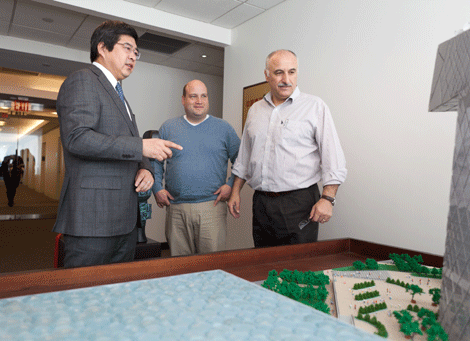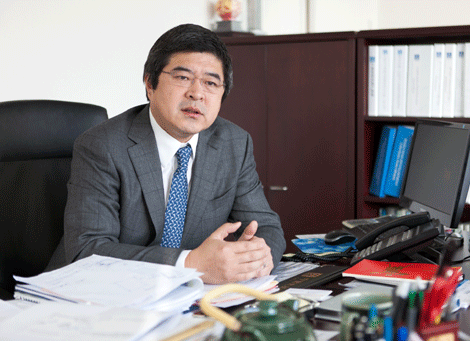Chinese working to reconstruct America
Updated: 2012-03-08 08:12
By Zhang Yuwei in New York (China Daily)
|
||||||||
 |
|
Yuan Ning (left) talks to Joseph Catapano (middle), a project manager with China Construction America, and another colleague in front of the models of the headquarters of China Central Television and the Beijing National Aquatics Center at their Jersey City office in New York. [Sun Peng / China Daily] |
Yuan Ning is leading the charge on a host of infrastructure projects
When Yuan Ning came to the United States to lead the local operation of the China State Construction Engineering Corporation in 2001, he made a big decision on how the company should navigate the US market.
"We should stay on the general contracting side and be practical about our operations in the US market," said Yuan, 47, sitting in his office at China Construction America headquarters in Jersey City, New York.
This decision led the wholly owned subsidiary of its Chinese parent, China's largest State-owned construction company, to becoming one of the most competitive construction companies in the US market.
Most recently, China Construction America was awarded a contract with the New York State Department of Transportation and kicked off the reconstruction of the Staten Island expressway and bus/high-occupancy vehicle lane extension.
The $109 million deal was the first China Construction America won as an independent contractor in New York State, Yuan said.
"It's a milestone for us because we always worked jointly with local companies on other projects in New York. It's understandable - we are a Chinese company, as you know," the China Construction America president said, indicating Chinese companies are still not fully accepted by some in the local construction market.
Back in China, more than 66 construction projects carried out by the Chinese parent company received the Lu Ban Award - the highest award in Chinese construction. Its construction portfolio includes the headquarters for China Central Television, the tallest skyscraper in Beijing, and the Beijing National Aquatics Center, or the Water Cube, which was used for swimming races during the 2008 Beijing Olympics.
China State Construction Engineering Corporation established its presence in the US in 1985. But the road for the company to reach where it is today has been a bumpy one.
"We entered the US market with 'ambitious goals' and invested in more than 70 residential projects across the US back then," Yuan recalled.
Real estate investment has been a major focus for China State Construction Engineering Corporation in China and the company thought it had the advantage to invest in the same area in the US.
The results, however, turned out to be somewhat unexpected. It eventually took the company about 15 years to wrap up the projects and it paid a big financial price, which Yuan didn't disclose.
"It's good to be ambitious, but we also need to know where we are and if we are ready," said Yuan.
In 2001, the company had to move its headquarters from the World Trade Center to Jersey City after the Sept 11, 2001, terrorist attacks.
But 2001 was also a turning point for the American subsidiary's business in the US. It won its first public works contract in the nation to build the Santee High School and Technology Center in South Carolina, after shifting its focus and becoming a general contractor. Since then, it has completed about 100 projects all over the US and is currently undertaking about 10 projects in New York, South Carolina, Washington DC and the Bahamas.
After all this time, China Construction America has gradually established its reputation and is no longer a newcomer to the US construction market.
In New York State alone, it won bids for projects including the renovation of the Alexander Hamilton Bridge (between Manhattan and the Bronx), construction of the ventilation shafts for the No 7 Subway line extension in New York (a $57 million deal), and the Yankee Stadium Station. The list just goes on.
The $407 million deal for renovating the Alexander Hamilton Bridge is currently its largest project in the US. It will help create nearly 10,000 jobs, including construction workers, suppliers and subcontractors, throughout the whole project, which is to be complete by December 2013.
"We feel big responsibilities for this project because a lot of planning work needs to be done for the renovation work of the bridge. We work mostly at night and have to make sure the traffic is smooth during the day," Yuan explained.
In South Carolina, the company is currently renovating the North Charleston Coliseum (a $12 million deal) and building the River Bluff High School (a $75 million deal).
On its 25th anniversary of operating in the US, New York City Mayor Michael Bloomberg congratulated the company, saying it "has worked with the utmost professionalism and dedication on America's buildings and infrastructure and communications networks".
In 2011, Harvard Business School published two case studies on China Construction America's operations in the US, featuring it as one successful example of Chinese companies tapping into the US market.
Even though it is a subsidiary of a Chinese State-owned company, Yuan said, he doesn't feel it is treated that differently here in the US.
"At least not in the past 10 years. People in the construction market here see our work, and they recognize it. We have built our reputation and it doesn't matter if we are a State-owned company or not," Yuan said.
"Strangely enough, only during the past few years - since the financial crisis actually - the sentiment started to change a little," Yuan said.
Yuan recalled that China Construction America experienced some setbacks in a few bids in recent years. In some cases, he said, the company wasn't even issued with the pre-qualification (screening of potential contractors on basic facts such as their experience, financial ability, reputation, and work history), something he said shouldn't happen to a well-established construction company like his.
"You would think this shouldn't happen during this time because the US needs help in fixing its economy. We bring capital and expertise and we create jobs. Most of all, we follow the local rules," Yuan said.
"I think it has something to do with politics, the upcoming elections for example. But I hope this is only temporary," he added.
For a Chinese construction company to compete in the US market and undertake these big public projects, the challenges can very well be imagined. Yuan admitted the difficulties, but he believes in expertise, hard work and a willingness to give the lowest bidding price.
He said the most important thing to bear in mind, for Chinese companies, or any foreign ones, is to play by the rules.
"True, we try to make China Construction America a localized company. But after all, we are seen as a Chinese company here, so there is no other way around it but to follow the rules," said Yuan, who also currently heads the General Chamber of Commerce-USA on a two-year term.
Over the past 10 years, China Construction America has grown from about a dozen employees to today's 1,000 in the US. Ninety percent of the staff, according to Yuan, are local hires.
Joseph Catapano, a project manager who oversees the Staten Island Expressway site, said he feels "very privileged" to work for the company.
"It's a very good opportunity for me and I see myself working here until I retire," said Catapano, who has 12 years of engineering experience in New York and California.
"We only employ union workers at our New York job sites," said Yuan, adding the company agreed to follow the "Buy America" rule for the Alexandra Hamilton Bridge project as one condition prior to the bid.
"Buy America" requires the US government to prefer US-made products in its purchases. In this case, companies that win bids should only use US-made products, such as steel.
Yuan said after so many years, China Construction America is ready to take on different projects, and maybe even go back to residential projects. Starting this year, its parent company is planning to invest $2 billion in the US market to boost its investment in public-private partnerships, infrastructure development, mergers and acquisitions and residential projects.
"We have an advantage to help the US build its infrastructure projects. We can bring money and our connections established with both Chinese and foreign banks (to generate the capital) and of course our expertise," Yuan said, calling it a "win-win solution".
After navigating the US market over the past years, China Construction America seems ready to really take off.
Last May, it started on a $3.6 billion resort development in the Bahamas, as both a general contractor and an investor.
The 44-month Baha Mar project, a complex on Nassau's Cable Beach, will employ some 8,000 workers and is projected to generate a 10 percent boost to the Bahamas gross domestic product, according to Baha Mar Ltd, the development company behind the project.
The development plan includes four hotels with more than 2,000 rooms, as well as a golf course, retail space, a convention center and the largest casino in the Caribbean.
"It is scheduled to be completed in December 2014 and is the largest overseas project undertaken by our company and the biggest commercial development abroad among Chinese companies," said Yuan proudly.
yuweizhang@chinadailyusa.com
 |
|
"We have an advantage to help the US build its infrastructure projects. We can bring money and our connections established with both Chinese and foreign banks (to generate the capital) and of course our expertise." Yuan Ning, president,China Construction America. |

 Relief reaches isolated village
Relief reaches isolated village
 Rainfall poses new threats to quake-hit region
Rainfall poses new threats to quake-hit region
 Funerals begin for Boston bombing victims
Funerals begin for Boston bombing victims
 Quake takeaway from China's Air Force
Quake takeaway from China's Air Force
 Obama celebrates young inventors at science fair
Obama celebrates young inventors at science fair
 Earth Day marked around the world
Earth Day marked around the world
 Volunteer team helping students find sense of normalcy
Volunteer team helping students find sense of normalcy
 Ethnic groups quick to join rescue efforts
Ethnic groups quick to join rescue efforts
Most Viewed
Editor's Picks

|

|

|

|

|

|
Today's Top News
Health new priority for quake zone
Xi meets US top military officer
Japan's boats driven out of Diaoyu
China mulls online shopping legislation
Bird flu death toll rises to 22
Putin appoints new ambassador to China
Japanese ships blocked from Diaoyu Islands
Inspired by Guan, more Chinese pick up golf
US Weekly

|

|







